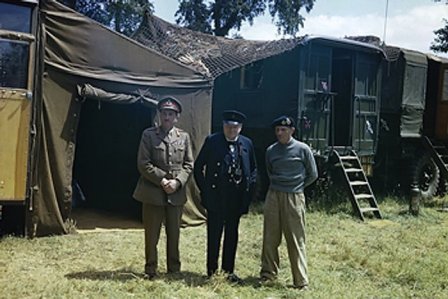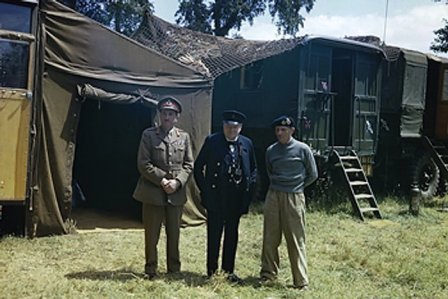
Bulletin #37 - Jul 2011
New York Times Sunday Book Review: How Hitler Could Have Won

June 21, 2011
By TIMOTHY SNYDER
THE NEW YORK TIMES, June 17, 2011 – How did the Wehrmacht, the best fighting force, lose World War II? The reader seeking the answer to this question, posed by Andrew Roberts in his splendid history, will be treated to a brilliantly clear and accessible account of the war in all of its theaters: Asian, African and European. Roberts’s descriptions of soldiers and officers are masterly and humane, and his battlefield set pieces are as gripping as any I have ever read. He has visited many of the battlefields, and has an unusually good eye for detail as well as a painterly skill at physical description. (His nearly perfect sense of terrain and geography is marred only by his regrettable conflation of Russia with the Soviet Union, which leads to confusion about battlefie ld locations, German war aims and Soviet casualties.) He is just as much at home at sea as on land; from Midway to El Alamein his prose is unerringly precise and stirringly vivid. It is hard to imagine a better-told military history of World War II.
ld locations, German war aims and Soviet casualties.) He is just as much at home at sea as on land; from Midway to El Alamein his prose is unerringly precise and stirringly vivid. It is hard to imagine a better-told military history of World War II.
The title of the book, “The Storm of War,” conceals an answer to Roberts’s central question about the reasons for the German defeat. The notion of war as a storm summons up the Nazi idea of a blitzkrieg, a lightning victory that would somehow resolve all of the political and economic problems of the German state. Yet the reference in the title is not German but British, not to Hitler but rather to Churchill, who told the House of Commons on June 4, 1940, that he had every confidence Britain could “ride out the storm of war.” Lightning signals not the end but the beginning of a storm; he who escapes the flash can survive, endure, get the wind at his back and in his sails, and triumph. The Wehrmacht lost the war because the conflict was long, and it was long in part because Churchill refused to abandon the fight, but chiefly because Germany’s main war aims were impossible to attain.
Roberts, the author of several books of English history, maintains the tension in his narrative by suggesting that if the war had been a purely military rather than a political contest, fought without errors on the German side, then the Germans might have won. If one considers the categories of martial endeavor from bottom to top, from the bunker to Berlin, one can see what he means. The Germans enjoyed advantages in weaponry, engagement, tactics and sometimes strategy. But at the moments when strategy was linked to politics, the German advantage was lost. Hitler’s war aims were vast, unrealistic and inextricably enmeshed in an ideology that celebrated destruction, above all of Jews and other racial enemies, but also of Germans when they failed to win. The quick successes in Poland in 1939 and France in 1940 convinced many of the generals that Hitler was indeed a genius. But what Hitler dreamed of was a rapid victory in the Soviet Union, which would have made Germany a great racial empire.

2025 International Churchill Conference
Throughout the book, Roberts notes errors that, if avoided, might have helped the Germans to win battles and perhaps even the war itself. Hitler, he says, should have begun the war three years later than he did, in 1942 rather than 1939. He should not have allowed the British to escape at Dunkirk as France fell. He should have arranged for the Japanese to help in the invasion of the Soviet Union. Once on Soviet territory German forces should have recruited the non-Russian populations rather than repressing them, and returned farmland to peasants rather than exploiting their labor and taking their food. In September 1941, Army Group Center of the Wehrmacht should have pushed forward to Moscow rather than detouring to Kiev. Army Group South should have fought a war of maneuver rather than concentrating on Stalingrad.
Inevitably, the reader of these observations will find himself posing counterfactual questions. If we agree with Roberts, as we should, that Churchill personally helped lengthen the war by keeping Britain from seeking peace terms after the fall of France, then we are also implicitly saying that, absent Churchill, peace might have been made. The war-winning alliance of the United Kingdom, the United States and the Soviet Union was sealed only in December 1941, and could not have been achieved had Britain left the war.
But even if the case for Churchill shows us the importance of this implicit counterfactual, it is still unclear just how to deal with Roberts’s explicit ones. Each depends upon careful judgment of what was thinkable in a given moment, and the fact that Roberts appears to use only English-language sources cuts against his ability to weigh convincingly what Hitler and other Germans considered possible. If Hitler had begun the war three years later, surely very many other things would have been different, and not all of them to his favor.
In other cases, the what-if’s require too much to be altered to be really useful. The reason German forces did not befriend the non-Russian minorities and assist the hungry peasantry in the Soviet Union was that they were embarked on a war of racial colonization that was meant to kill tens of millions of Jews and Slavs. In the end, as Roberts himself concludes, that is the war Hitler wanted. And as he knows, the reason Japan did not help the Germans in the Soviet Union was that Hitler did not want Japanese help. What’s more, the Japanese themselves had already decided to move south into the Pacific rather than north into Siberia. Tokyo had been quite powerfully alienated from Berlin by the Molotov-Ribbentrop pact of 1939, in which Berlin seemed to exchange its alignment with Japan for an alliance with the Soviet Union. In other words, sometimes what appears at first to be just a matter of Hitler’s own decisions in fact involves the thinking of leaders of other countries as well, which means that the exercise becomes much more complicated.
Then, too, what if Poland had agreed in 1939 to join Germany in an invasion of the Soviet Union, as Hitler wanted? If Poland had allied with Germany rather than resisting, Britain and France would not have issued territorial guarantees to Poland, and would not have had their casus belli in September 1939. It is hard to imagine that Britain and France would have declared war on Germany and Poland in order to save the Soviet Union. If Poland’s armies had joined with Germany’s, the starting line for the invasion would have been farther east than it was in June 1941, and Japan might have joined in, which would have forced some of the Red Army divisions that defended Moscow to remain in the Far East. Moscow might have been attained. In this scenario, there is no Molotov-Ribbentrop pact, and thus no alienation of Japan from Germany. In that case, no Pearl Harbor, and no American involvement. What World War II becomes is a German-Polish-Japanese victory over the Soviet Union. That, by the way, was precisely the scenario that Stalin feared.
Whether they admit it or not, every historian reasons with what-if’s. Their value is that they remind us of what we might otherwise take for granted: in this case, that Poland resisted Germany, thus beginning World War II as we know it, and as Roberts beautifully describes it. Though the counterfactuals in Roberts’s conclusion provoke thought, the real interest of his book resides in its robustly conventional virtues — scholarly dedication to the sources, humane identification with the soldiers and remarkably effective prose.
Timothy Snyder, a professor of history at Yale University, is the author, most recently, of “Bloodlands: Europe Between Hitler and Stalin.”
Read the entire review at © The New York Times
THE STORM OF WAR
A New History of the Second World War
By Andrew Roberts
Illustrated. 712 pp. Harper/HarperCollins Publishers. $29.99.
Subscribe
WANT MORE?
Get the Churchill Bulletin delivered to your inbox once a month.




